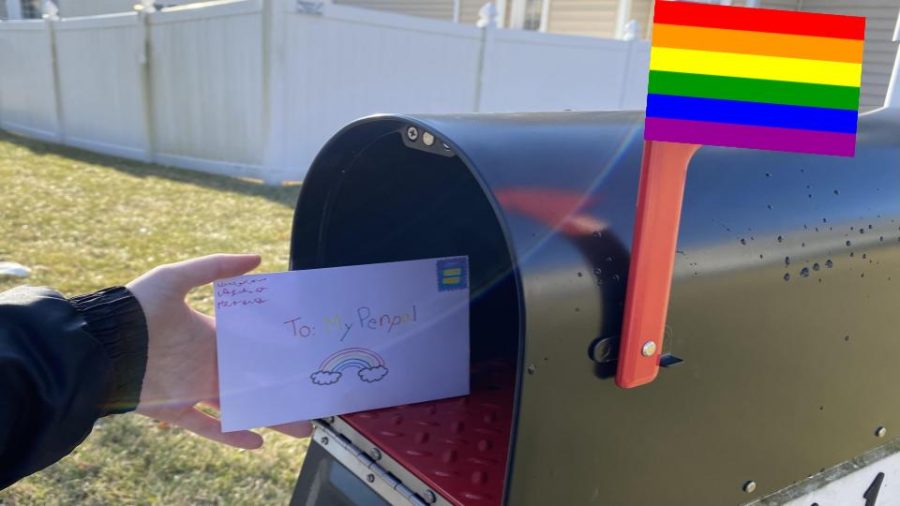GSA promotes “Snail-(E)mail” among LGBTQ+ students facing pandemic
“I think having a friend to talk to who has had similar experiences is important for everyone.”
January 11, 2021
Merriam-Webster just announced the word of the year is “Pandemic.” With that, add all of the vocabulary we now use daily: Zoom meetings, Google Meet, Breakout Rooms, quarantine, social distancing and more.
To combat all this modern technology, throwback trends are big: scrunchies, jigsaw puzzles, baggy jeans, and vinyl records.
The GSA prefers “Snail (E)-mail,” bringing back the type of “slower” communication our parents used.
The Linganore Gender-Sexuality Alliance (GSA), which has been meeting virtually since September, has established a pen pal program for GSA students throughout Frederick County Public Schools. The program has matched students with partners from other schools, based on common interests, and has created countless connections.
In October 2020, the program included 54 FCPS students at six schools, but, based on the early success of the program, it expanded to include 87 students across seven high schools and three middle schools.
GSA Advisor Jessica Baker initiated the idea. She said, “The GSA advisors from around the county have said that their ‘students are PUMPED’ to be involved in this program. They are excited with the prospect of connecting with someone in a very lonely world. It’s nice to be able to share your thoughts, dreams, artwork, and hobbies with someone else.”
According to the New York Times, “snail-mail” has taken “fresh resonance” in this time of social unrest and unpredictability.
While writing physical letters is considered a typical form of communication for a pen pal, every pair is different, as there is variability of LGBTQ+ acceptance within households.
“Some students have been given the option to use school or personal emails instead of writing physical letters,” said GSA Officer Toby Morseman. “This ensures that students in non-affirming households are safe and are still able to have a pen pal.”
Baker said, “I wanted students in the county to know that there are so many people just like them. I wanted a chance to meet the other advisors as well, so reaching out to them via email has gotten me in contact with them.”
Of course, many students have expanded to make connections on social media as well.
GSA Officer Natalie Blue said, “My pen pal and I connected right away. We started talking through email, then Instagram, then Snapchat, and have been in contact with each other every day since the beginning of the program started. It’s so cool getting to talk about interests we share, as well as listening to her talk about her own interests.”
This entire idea of a pen pal program sparked interest with students, not only because many are isolated in their homes, but also because many students in the LGBTQ+ community are not comfortable, or accepted as their true selves in their homes and families. These pen pals have allowed for these students to have a social connection outside the home, while simultaneously staying safe.
According to the US National Library of Medicine, “One-third of youth experience parental acceptance, another third experience parental rejection, and the remaining third do not disclose their sexual orientation even by their late teenage years and early twenties.”
“I think this is a great outlet for teens in this area, especially for those in less progressive households,” said Morseman, “They can make friends with fellow LGBTQ and ally students who they probably would not have met otherwise. I think having a friend to talk to who has had similar experiences is important for everyone.”
The pandemic contributes to the isolation all teens feel, but especially those who were already feeling “different” or “alone.”
Covid-19 has had a significant impact on mental health, specifically that of LGBTQ+ youth. While studies have shown that young people are not as, “high-risk” to the virus as older folks, or those with preexisting conditions, LGBTQ+ youth are certainly not immune to negative mental-health impacts as a result of isolation.
According to the Trevor Project, even before the pandemic, LGBTQ+ youth have been found to be at increased risk for depression and anxiety. Ways to combat these issues include positive social interaction, which is what the pen pal program has promoted, in a “corona-safe” way.
“I thought of the idea of connecting LGBTQ+ students together because it’s hard to meet people in the community as it is, even more challenging during quarantine,” said Baker.
Of course, this is a program that will want to be continued once the world has become more, “normal.”
“I think the program should definitely continue when America gets corona under control,” said Blue. “My pen pal and I have talked about how we wanted to meet up and hang out when it is okay to go places, so I feel like things going back to normal will just open up more ways of communicating.”
For those who are at all interested in the GSA, Baker said, “You do not have to identify as part of the LGBTQ+ community to be involved in GSA. You just have to have an appreciation and understanding for people that are different from you.”
Linganore’s GSA is currently the largest in the county, with 38 active members this year. They are eagerly accepting new members at any time. Contact Ms. Baker for more information, [email protected].



